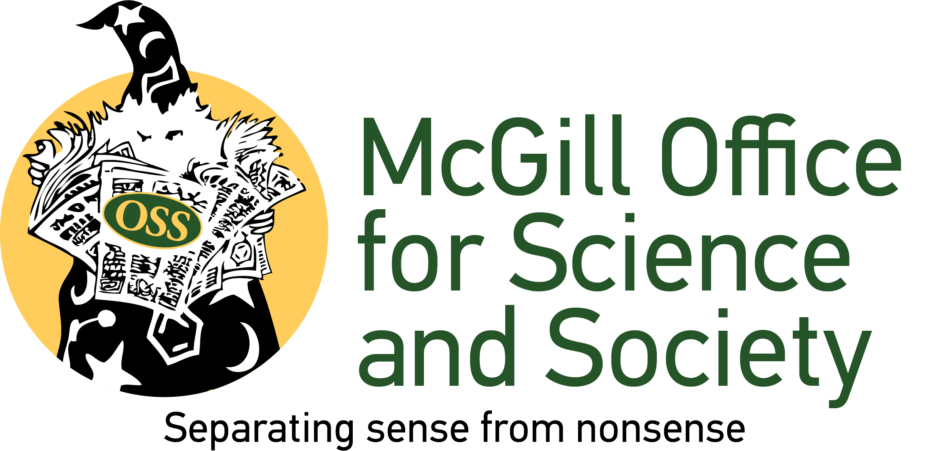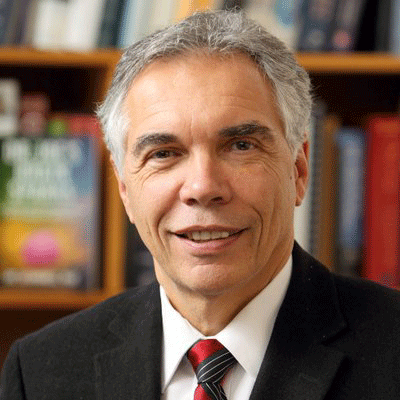
Quackery is hardly new. From bloodletting to snake oil potions, hucksters and charlatans have always been eager to promote “miracle solutions.”
But they’re not the real problem. That would be the large segment of the population gullible enough to give credence to those hucksters and charlatans and the wares they peddle, ignoring science altogether. Handmaiden to that are the accusations levelled at scientists and their hard-won data of being shills for business interests or tools of government propaganda – the equivalent of saying fake news when the news is not to your liking. Anti-vaxxers come to mind. Or the now-thankfully-dormant anti-fluoridation crowd.
With massive amounts of information – never to be confused with knowledge – available instantly on the Internet, separating the wheat from the chaff has become increasingly difficult.
De-coupling pseudo-science and outright falsehoods from actual science is the self-imposed task taken on by McGill’s Office for Science and Society (OSS), which is celebrating its 20th anniversary on May 23.
Director Joe Schwarcz said in an interview that the OSS started out in 1999 as the Office for Chemistry and Society, but the torrent of unverified assertions and claims on the web forced its rapid transition to cover more than just chemistry. Separating sense from nonsense, as its motto goes, requires vigilance, thoroughness and a little thing called knowledge – a tough challenge, and a never-ending one.
Exhibit A: The vaccination controversy
The never-ending part stems from the fact that it’s far simpler to make a wildly false assertion than to correct that false assertion. Case in point: the debacle fraudulently linking the measles, mumps and rubella vaccine with autism.

That saga springs almost entirely from a 1998 study published in the respected medical journal The Lancet and authored by a gastroenterologist who falsified data and was eventually barred from practicing medicine in the U.K. The fraud has resulted in an alarming vaccination rate drop in Canada, the U.S. and Ireland, among others, and a corresponding increase in severe cases of – even deaths from – treatable diseases like mumps and measles.
So much for the physician’s Hippocratic oath of “First, do no harm” (itself a small quackery, given that it’s a 19th century paraphrase of the oath written by Hippocrates 2,400 years earlier).
Not everything that needs debunking is as serious as that. There are all the claims about bio nutrition, organic this, natural that, miracle cancer cures, magical vitamin C slimming diets, etc.
“Our mission is to de-mystify science for the public, separate sense from nonsense, foster critical thinking and make people aware of what’s going on in the world of science,” said Schwarcz. “And if all of that works, keep them out of the clutches of charlatans.”
The hurdles are significant: “Magical thinking” is much more seductive than a rigorous scientific examination.
“It’s far easier to think there are simple solutions and conspiracies to keep these simple solutions hidden by big Pharma, big Agro (agri-food industry), so that they can keep all the profits for themselves. You know, ‘There are cancer cures out there that are being hidden so that they can sell us their expensive but useless chemotherapeutic agents’.”
Quacks: Blindly assertive and dogmatic
Has the OSS made inroads in countering pseudo-science and falsehoods?
Schwarcz replied: “Basically, we’re swimming up Niagara Falls,” particularly on the Internet.
Jonathan Jarry, an OSS Science Communicator who co-runs the website The Body of Evidence that keeps “a skeptical eye (on) health claims,” said “there’s no reduction in quackery. But if we’re not out there fighting this fight, who will? Occasionally we get messages that say ‘I used to think this but now I think that, so thanks.’ That’s gratifying. But no, we’ll never get rid of pseudo-science.”
One telling clue about scientific claims is the degree of certainty of proponents of a point of view. Science is rigorous if correctly done, but isn’t foolproof – and admits it – because humans are not foolproof. But quacks, whose theses are usually contrarian to established science, tend to be blindly assertive and dogmatic.
“They know everything,” said Schwarcz. “Scientists understand that certainty is very elusive.”
Academics often cannot, or decline to, speak in everyday language to the general public, Schwarcz said, leaving the field open to quacks to make false claims in simple, quickly digestible bites.
“Our specialty at OSS is just like an area of science. You have to think about it, work at it. What words are we going to use?”
Evidence is everything
Broadly speaking, there are three categories of people, said Schwarcz: “About 10 per cent are well-read, intelligent and good critical thinkers – they’ll figure things out. At the other extreme, the ones who swallow all the nonsense is a large category, I’d say 30 per cent to 40 per cent. Many of them are well-meaning. Self-delusional, but they think they are doing the right thing. In the middle are 40 per cent to 50 per cent of people who are bewildered. To them, it seems science is going back and forth – one day eggs are good, the next they are bad.”
“They are the ones willing to listen to cogent arguments. They know they don’t know. Those are the ones with whom I think we have a chance of making an impact.”
With the help of a $5.5-million donation from the Trottier Family Foundation, the OSS has grown to five people. In addition to individual lectures, Schwarcz’s radio show and column in the Montreal Gazette, the office teaches two main courses to overflowing audiences: one on drugs and the other on food.
“But everything is on the main theme, really,” said Schwarcz. “Abiding by what is known and can be documented. You know, evidence-based.”
To receive the McGill OSS Weekly Digest, sign-up here.
Get more information about the Office for Science and Society.
